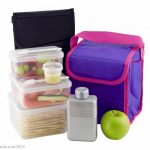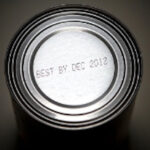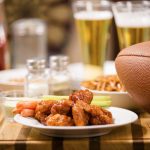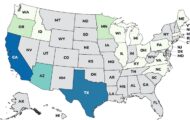Your kitchen sink is an important part of food safety and preventing foodborne illness, according to the USDA. Think about everything you use your sink for: rinsing produce, cleaning pots, pans, plates, cups, and utensils, and discarding meat and produce scraps. All of those things can carry pathogenic bacteria. The USDA recently completed a study looking at how consumers handle food and how good they are at preventing cross-contamination. Participants prepared a meal with raw sausage, shell eggs, and a fruit salad made with cantaloupe. That study showed that the kitchen sink was the most cross-contaminated part of the kitchen at 34%. And 26% of samples of cut-up cantaloupe removed from the completed fruit salad was contaminated with bacteria. There are several ways this can … [Read more...]
Surprising Bacteria Source: Wash Your Wrist Bands!
A new study from Florida Atlantic University's Charles E. Schmidt College of science reveals a surprising bacteria source: your wrist band. If you wear a watch, you should wash your wrist bands regularly. Most people do not clean wristbands. The researchers tested plastic, rubber, cloth, metal, and leather wristbands to see if there is a correlation between the material the wrist bands are made of and the level of contamination. They also clarified the best way to disinfect them. The results of the study, which were published in the journal Advances in Infectious Diseases, suggested that metal wristbands are cleaner. In spite of the fact that 95% of all wristbands tested were contaminated, gold and silver bands had little or no bacteria. Nwadiuto Esiobu, Ph.D., senior author … [Read more...]
FDA Food Safety Tips For the Hurricane Season
The FDA is offering food safety tips for the hurricane season, including what to do about power outages and flooding. There are lots of things to think about and do, including safeguarding medications, water, and pets. Everyone, not just people in hurricane-prone areas, should maintain a waterproof emergency kit that is stocked with non perishable food, extra medication, and hygiene supplies. Non perishable food includes shelf stable items including canned food such as tuna, vegetables, fruits, and soups, bread, peanut butter, granola bars, crackers, nuts, trail mixes, mayonnaise, mustard, dried milk, and jams and jellies. Be sure to include a can opener. Food, water, and medical supplies will be hard to find both before and after a storm. Make sure that you have enough of your … [Read more...]
Labor Day Weekend Food Safety Travel Tips From the USDA
Labor Day weekend food safety travel tips come from Jesus Garcia, Public Affairs Specialist with the Food Safety Education Staff with the USDA. While many people stay at home during this long holiday weekend, others travel, especially to campsites and to go on picnics. And food safety is even more critical when you are away from home. First pack perishable foods into your cooler directly from the fridge or freezer. You can pack meat and poultry products while they are still frozen. Put an appliance thermometer in your cooler to make sure that the food stays safe and cold at 40°F or below. The danger zone, when bacteria counts can double in food every 20 minutes, is from 40°F to 140°F. Keep raw meat and poultry away from cooked foods and produce that is eaten raw, in the cooler … [Read more...]
USDA Offers Guide to Food Safety For School Lunches
Yes it's that time of the year. The USDA is offering parents a guide to food safety for school lunches. There is an inherent risk in packing perishable foods for your child to take to school every day, but with these rules you need to follow you can make sure the food stays safe to eat. USDA Under Secretary for Food Safety Dr. Emilio Esteban said in a statement, "While there have been huge strides in food safety, at least 48 million people in the U.S. are still affected by foodborne illness every year. Our children’s health and safety depend on the safe food handling practices we teach and practice at home." Food safety for school lunches starts in your kitchen. When you prepare food for your child's lunch, and your own too, follow the steps of clean, separate, cook, and chill. … [Read more...]
Celebrate the Fourth of July Without Foodborne Illness
Celebrate the Fourth of July this year without foodborne illness, with tips from the USDA about safe grilling. There are inherent risks that come with cooking in hot weather too. First, always wash your hands before cooking and handling and serving food. Handle raw meat with care, since it can be contaminated with pathogen bacteria such as E. coli, Salmonella, Listeria monocytogenes, and Campylobacter. Keep raw meats away from foods that are eaten uncooked such as raw fruits and vegetables. When you form hamburgers or season steaks, using a separate cutting board and plate. And wash your hands thoroughly with soap and water after touching uncooked meat and poultry. If you marinate the meat or poultry, keep the used marinade away from other foods, and discard it when you put the … [Read more...]
It’s World Food Safety Day. Time to Review Food Safety Rules
June 7 is World Food Safety Day. This day is a good time to review food safety rules that everyone should know to try to avoid food poisoning. While Corporations are not allowed to sell food contaminated with enough bacteria to make people sick, it happens a lot. The consumer is the last line of defense against pathogenic bacteria. The main things to remember are four key words: Clean, Separate, Cook, and Chill. That means you need to clean your hands before you start cooking, and wash fruits and vegetables before you prepare them. (Never wash poultry or raw meat!) Make sure your kitchen is clean, along with utensils and dishes. Then keep uncooked foods and raw foods separate. Do not let meat or poultry juices touch fruits and vegetables, store them apart from each other in the … [Read more...]
Food Safety Tips For Passover and Easter
These food safety tips for Passover and Easter will help you celebrate while keeping everyone safe from food poisoning. Every time a group of people gather to eat, food safety rules are very important, especially if the group includes people at high risk for serious complications from foodborne illness. Of course, follow the rules of Clean, Separate, Cook, and Chill. Clean your kitchen before you start and wash your hands and utensils to avoid spreading pathogens. Separate by keeping raw meats, poultry, and eggs from foods that are eaten uncooked such as produce. Cook food to safe final internal temperatures and test with a food thermometer. Chill leftovers within two hours of taking food out of the oven or fridge; one hour if the air temperature is 90°F or higher. Eggs Eggs … [Read more...]
FDA on Food Waste and Food Safety: What About Expiration?
The FDA is offering information on food waste and food safety, or what do you need to know about expiration dates? Most products have a "best by" or "best if used by" date stamped somewhere on the container. What do they mean? And can you eat a food that is past that date? This information is important because food waste is a terrible problem in this country. For instance, 80% of our freshwater is used getting food on the table, along with half of our land. Organic waste, mostly food, is the second biggest component of landfills. And those landfills are the third largest source of methane emissions, a greenhouse gas. Since between 30 to 40% of food in the U.S. goes uneaten, we are discarding $165,000,000,000 in food every year. Food waste and food safety are connected because … [Read more...]
Food Safety For Your Super Bowl Party From the USDA
The Super Bowl is this Sunday. Are you having a party? Get food safety tips for your Super Bowl party from the USDA to stay safe and protect your guests from food poisoning. USDA Under Secretary for Food Safety, Dr. Emilio Esteban, said in a statement, "Many Americans enjoy delivery and takeout foods during the Super Bowl for convenience, but food safety precautions are the same as food prepared at home. To prevent foodborne illness, food should not be left out for over two hours without proper heating or cooling and should be placed out in small amounts and replenished as needed to keep your family and friends safe." Always follow the rules of Clean, Separate, Cook, and Chill to keep food that you make at home safe to eat. Clean after handling raw meats and poultry, keep foods … [Read more...]














